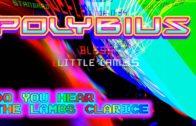Polybius
The weird people from Llamasoft, you know, those cow, lambs, giraffes loving guys who brought us games like Space Giraffe, now give us Polybius.
And once again, this is not your average game. Like Space Giraffe most of the time I have no idea what I’m doing. And I know, that’s me. There really is something here, it’s just not that easy to find. But that’s what I expect from Llamasoft and I love it!
You are going to see strange things on your screen and hear even strangers sounds besides the awesome soundtrack. Cows mooing? Weird screams and more.
It’s a weird, psychedelic, spacey, awesome experience!
Did you know that there’s a whole (his)story behind the game Polybius? (not Llamasoft game).
Polybius is an alleged 1981 arcade game described in a 1998 urban legend. The original game’s actual existence has never been authoritatively proven, but it has served as inspiration for several free and commercial games by the same name.
The urban legend is that the game was part of a government-run crowdsourced psychology experiment, with gameplay producing intense psychoactive and addictive effects in the player. These few publicly staged arcade machines were said to have been visited periodically by men in black for the purpose of data-mining the machines and analyzing these effects. Finally, all of these Polybius arcade machines allegedly disappeared from the arcade market.
An entry for the title was added to arcade game resource coinop.org on August 3, 1998. The entry mentions the name Polybius and a copyright date of 1981, although no such copyright has ever been registered. The author of the entry claims in the description to be in possession of a ROM image of the game, and to have extracted fragments of text from it, including “1981 Sinneslöschen”. The remainder of the information about the game is listed as “unknown”, and its “About the game” section describes the “bizarre rumours” that make up the legend.
The story tells of an unheard-of new arcade game appearing in several suburbs of Portland, Oregon in 1981, something of a rarity at the time. The game is described as proving popular to the point of addiction, with lines forming around the machines often resulting in fighting over who would play next. The urban legend describes how the machines were visited by men in black, who collected unknown data from the machines, allegedly testing responses to the game’s psychoactive effects. Players supposedly suffered from a series of unpleasant side effects, including amnesia, insomnia, night terrors and hallucinations.
Approximately one month after its supposed release in 1981, Polybius is said to have disappeared without a trace. Ben Silverman of Yahoo! Games remarked: “Unfortunately, there is no evidence that the game ever existed, no less turned its users into babbling lunatics… Still, Polybius has enjoyed cult-like status as a throwback to a more technologically paranoid era.”
The company named in most accounts of the game is Sinneslöschen. The word is described by writer Brian Dunning as “not-quite-idiomatic German” meaning “sense delete” or “sensory deprivation”. These meanings are derived from Sinne, “senses” and löschen, “to extinguish” or “to delete”.
Polybius received some mass-market attention in the September 2003 issue of GamePro magazine, as part of a feature story on video games called “Secrets and Lies”. The article declared the existence of the game to be “inconclusive”. Snopes.com claims to have debunked the existence of the game as a modern-day version of 1980s rumors of “men in black” visiting arcades and taking down the names of high scorers at arcade games. This led to the hypothesis that the government was hosting some sort of experiment and sending subliminal messages to the players.
Though the original has never been authoritatively located, several video games have been published using the name Polybius, drawing upon the urban legend as inspiration. The claims made in the urban legend of psychoactive or subliminal effects do not apply to these games.
In 2007, PC freeware developers and arcade constructors Rogue Synapse offered a free downloadable game titled Polybius for PC. The game’s design is partly based on a contested description of the Polybius arcade machine posted on a forum by an individual named Steven Roach who had claimed to have worked on the original.
Chris Trimiew, owner of Lost Classics, is the author of a homebrew Atari 2600 game named Polybius (2013). Gameplay is not claimed to be based on the original game, and the author expressed doubt that the Atari 2600 hardware would be able to emulate anything close to the claimed original arcade game.
In 2016, Llamasoft announced a game called Polybius for the PlayStation 4 with support for the PlayStation VR.
In popular culture Polybius machines have appeared in the background of arcade scenes on television shows and in other media. In the 2006 episode of The Simpsons, titled “Please Homer, Don’t Hammer ‘Em”, a Polybius cabinet appears in an arcade full of outdated arcade machines from the 1970s and 1980s, bearing a single button and printed with the words “property of US Government”. The game also appears in the background of two episodes of the 2014 television show The Goldbergs and a poster advertising the game is present in the local theater, in the comic Batman Inc. No. 1 (2012), and on a T-shirt in Vertigo’s 2008 House of Mystery series.
(451)













